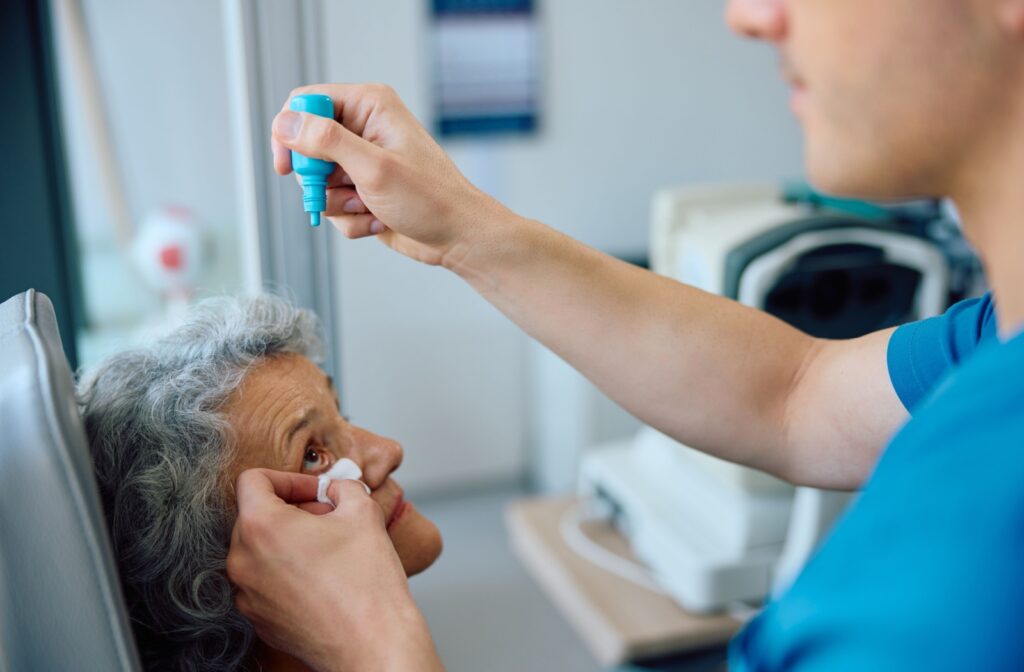Caring for our eyes and vision goes beyond visiting your optometrist for an updated glasses prescription. We have to care for the overall health of our eyes as well.
Dilation exams provide an in-depth analysis of the health status of the internal structures of the eye. This allows your optometrist to check for signs or progressions of eye conditions and diseases, which can manifest without any associated symptoms.
Understanding The Dilated Eye Exam
A dilated eye exam is a comprehensive ocular health assessment using specialized eye drops to dilate your pupils, to get a detailed look at the internal structures of your eye. This exam helps to diagnose a range of eye conditions and diseases that aren’t visible with an undilated exam.
Depending on the health status of your eye, this exam may be done during your routine eye exam or in addition to this visit, especially if your optometrist is monitoring the progression of an eye condition.
The eye drops used in dilation contain medications that temporarily relax the muscles of your iris, allowing your pupils to widen. While your pupils widen, it’s common to experience light sensitivity and blurry vision, because our ability to focus on nearby objects reduces as more light enters the eye.
These side effects usually last a few hours. After the dilation, wearing sunglasses helps to reduce discomfort from any light sensitivity.
A dilation exam is a safe, gentle, and vital component of caring for our ocular health.
Who Should Consider a Dilated Eye Exam?
While not everyone needs to undergo this exam, it’s highly recommended for certain individuals, including those with:
- Diabetes
- Family history of eye diseases
- Older adults
Even if you don’t fall into these categories, your optometrist may recommend one based on your overall ocular health.
Generally, it’s recommended that adults have a comprehensive eye exam, including dilation, every two years. Individuals at higher risk for eye conditions are encouraged to have these exams annually.
Detecting Eye Conditions & Diseases with a Dilation
Once fully dilated, your optometrist can assess the status of your ocular health using retinal imaging, OCT scans, and slit lamp examination and look for any signs of complications.
Many eye conditions can manifest without symptoms, highlighting the importance of routine exams and dilations. Without a dilation exam, it’s difficult to determine the severity and progression of these conditions.
- Glaucoma: A group of eye conditions that damages the optic nerve and affects peripheral vision due to increasing eye pressure. If left untreated, it can lead to vision loss. A dilated eye exam helps to identify changes to the optic nerve early for more effective treatment.
- Macular Degeneration: This eye disease affects the central part of the retina, known as the macula, which is responsible for sharp, central vision. This condition can lead to a blind spot in your field of vision and blurry vision. During a dilated exam, optometrists look for drusen, and other changes in the macula for early detection and management.
- Retinal Detachment: This is a medical emergency where the retina separates from its underlying supportive tissue. If not treated promptly, the detachment can cause retinal cells to be deprived of oxygen and nutrients, leading to vision loss. By dilating the eyes, doctors can examine the retina thoroughly to identify any tears or detachments that require immediate attention.
- Cataracts: A cataract is a clouding of the eye’s natural lens. Although this condition can be visible without dilating, the exam helps understand its severity and the clarity of the lens.
- Diabetic Retinopathy: Diabetic retinopathy is a diabetes-related eye condition affecting blood vessels in the retina. High blood sugar over time, can damage these vessels leading to swelling, leakage, or blocking blood flow to the retina. This can lead to blurry vision or vision loss. A dilated exam allows doctors to check for abnormal changes.

What to Expect During a Dilated Eye Exam
While this exam is relatively gentle, it does involve quite a bit of waiting. A dilation exam can take anywhere between 40 minutes to an hour depending on the status of your ocular health.
Knowing what to expect during your dilation appointment can help you feel more at ease during your visit.
The process begins with administering specialized eye drops that dilate the pupils. It takes about 20 to 30 minutes for your pupils to dilate fully. As your pupils dilate, it’s common for your vision to become increasingly blurry and light-sensitive.
Once fully dilated, various tests and instruments are used to assess the eye’s internal structures:
- Visual Field Exam: This assesses one’s overall field of vision, including peripheral and central vision. During a dilation exam, this test becomes crucial as it can help detect early signs of eye conditions, like glaucoma.
- Optical Coherence Tomography (OCT): This machine takes detailed cross-sectional retinal scans. These images can reveal swelling, thinning, or other changes in retinal structure associated with macular degeneration or diabetic retinopathy. The convenience of this imaging means that scans can be repeated over time to monitor disease progression and evaluate the efficacy of treatments.
- Retinal Photos: These high-resolution images provide a detailed view of the back of your eye, helping to identify any abnormalities or changes over time. Retinal photos are especially useful for tracking the progression or improvement of chronic eye diseases, like diabetic retinopathy.
- Ophthalmoscope: This is a handheld device used to examine interior structures of the eye, especially the retina and optic nerve. It uses a light and magnifying lens to detect abnormalities like swelling, degeneration, or optic nerve damage.
- Slit Lamp: This specialized microscope provides a three-dimensional view of the eye, allowing a comprehensive analysis of the eye’s anterior and posterior segments. It helps determine the health of the cornea, lens, iris, and retina by magnifying these structures.
Schedule a Visit with Your Eye Doctor
The importance of dilated eye exams cannot be overstated. This visit allows your optometrist to detect and treat serious eye conditions before they cause irreversible damage.
Our Eye Lab team aims to provide our patients with ongoing, compassionate eye care. Connect with us to schedule an appointment for your routine eye exam and dilation.





